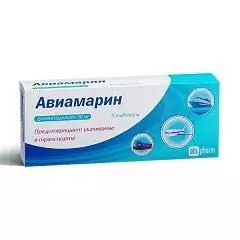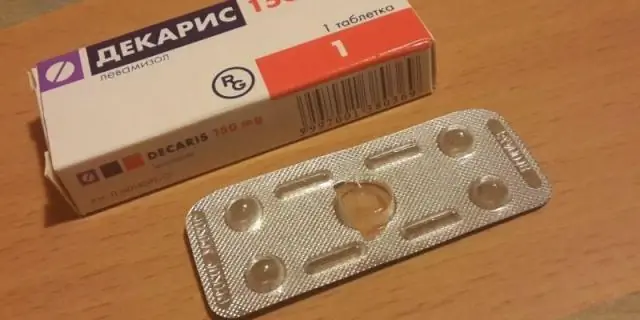- Author Rachel Wainwright wainwright@abchealthonline.com.
- Public 2023-12-15 07:39.
- Last modified 2025-11-02 20:14.
Aviamarin
Aviamarin: instructions for use and reviews
- 1. Release form and composition
- 2. Pharmacological properties
- 3. Indications for use
- 4. Contraindications
- 5. Method of application and dosage
- 6. Side effects
- 7. Overdose
- 8. Special instructions
- 9. Application during pregnancy and lactation
- 10. Use in childhood
- 11. Drug interactions
- 12. Analogs
- 13. Terms and conditions of storage
- 14. Terms of dispensing from pharmacies
- 15. Reviews
- 16. Price in pharmacies
Latin name: Aviamarin
ATX code: R06AX
Active ingredient: dimenhydrinate
Producer: Obolensk pharmaceutical company, CJSC (Russia)
Description and photo updated: 22.11.2018
Prices in pharmacies: from 79 rubles.
Buy

Aviamarin is a blocker of H1-histamine receptors, used for pathologies of the vestibular apparatus.
Release form and composition
Aviamarin is produced in the form of tablets: round, flat-cylindrical, with a dividing line and a chamfer, from almost white to white (5 or 10 pcs. In blisters; in a cardboard box 1 or 2 packages).
The composition of 1 tablet contains:
- active ingredient: dimensionhydrinate - 50 mg;
- auxiliary ingredients: crospovidone, povidone, microcrystalline cellulose, mannitol, magnesium stearate, aerosil (colloidal silicon dioxide).
Pharmacological properties
Pharmacodynamics
The active component of Aviamarin is dimensionhydrinate, which blocks m-cholinergic receptors and histamine H1 receptors in the central nervous system. Suppresses the function of the vestibular apparatus of the inner ear, primarily acting on otoliths, and in high doses - on the semicircular canals. Has antiemetic, anorexigenic, sedative effect and eliminates dizziness.
Pharmacokinetics
- absorption and distribution: after oral administration, dimensionhydrinate is well absorbed, actively distributed throughout organs and tissues, showing an effect 15-30 minutes after administration and keeping it for 3-6 hours. Up to 78% of the substance binds to blood plasma proteins;
- metabolism and excretion: Dimenhydrinate is metabolized in the liver, it is almost completely eliminated from the body in the urine within 24 hours. In small amounts, it can be excreted in breast milk. The half-life (T1 / 2) of dimensionhydrinate is approximately 3.5 hours.
Indications for use
Aviamarin is recommended for the treatment of motion sickness (automobile, sea and air), prevention and treatment of symptoms of vestibular and labyrinth pathologies (nausea, vomiting, dizziness), except those caused by anticancer therapy, and the treatment of Meniere's disease.
Contraindications
Absolute:
- acute exudative / vesicular dermatoses;
- epilepsy;
- age under 3 years old;
- first trimester of pregnancy and lactation period;
- individual hypersensitivity to any components of the drug.
According to the instructions, Aviamarin should be taken with caution (relative contraindications):
- with convulsive syndrome;
- with angle-closure glaucoma;
- with prostatic hyperplasia;
- with bronchial asthma;
- with cardiovascular diseases;
- with hyperthyroidism;
- with stenosing peptic ulcer;
- with pyloroduodenal obstruction;
- with obstruction of the bladder neck.
Instructions for the use of Aviamarin: method and dosage
Aviamarin tablets should be taken orally, just before meals.
Recommended single doses, subject to taking tablets 2-3 times a day:
- motion sickness (automobile, sea and air); prevention and therapy of symptoms of vestibular and labyrinth pathologies (nausea, vomiting, dizziness), except those caused by anticancer therapy: children 3-6 years old - 0.25-0.5 pcs.; children 7-12 years old - 0.5-1 pcs.; children over 12 years old and adults - 1-2 pcs.;
- Meniere's disease: children 3-12 years old - 0.5-1 pcs.; children over 12 years old and adults - 1-2 pcs.
For adult patients, the maximum daily dose is 7 pcs.
For the prevention of kinetosis take 1-2 pieces. 0.5 hours before the trip.
The duration of use and the possibility of repeating the course should be agreed with the doctor.
Side effects
- blood and lymphatic system: very rarely - agranulocytosis, hemolytic anemia, leukopenia, neutropenia, thrombocytopenia, pancytopenia;
- immune system: rarely - anaphylactic shock;
- mental disorders: often - anxiety, mood lability, stiffness of movements; infrequently - insomnia;
- central nervous system: often - drowsiness; infrequently - imbalance, impaired concentration and memory impairment (more often in old age), tremor, uncoordinated movements, hallucinations, confusion; rarely - headache, dizziness, sleep disturbance, orthostatic hypotension; extremely rarely - paradoxical stimulation of the central nervous system, especially in children;
- organ of vision: rarely - vision problems (blurred vision, double image, mydriasis), glaucoma;
- organ of hearing and labyrinthine disorders: rarely - tinnitus;
- heart: rarely - tachycardia, heart palpitations, hypotension;
- respiratory system, chest and mediastinal organs: often - swelling of the nasal mucosa (nasal congestion);
- gastrointestinal tract: often - nausea, constipation, diarrhea, dry mouth, abdominal pain;
- hepatobiliary system: with an unknown frequency - liver failure (cholestatic jaundice);
- skin and subcutaneous tissue: rarely - rashes, redness;
- genitourinary system: often - violation of urination (delay due to anticholinergic action);
- general disorders: rarely - edema (less often - Quincke's edema).
The patient should notify the attending physician about the aggravation of any of the above side effects or the appearance of other reactions.
Overdose
Symptoms of a dimensionhydrinate overdose are dry mouth, nose and throat, flushing of the face, confusion, labored and slowed breathing; in children, hallucinations and seizures are possible. The appearance of these symptoms requires immediate medical attention.
It is recommended to wash the stomach with a suspension of activated carbon (20-30 g), use a saline laxative (10-15 g of sodium sulfate), if necessary, carry out symptomatic therapy. In children with seizures, phenobarbital (5-6 mg / kg) and diazepam are prescribed.
special instructions
Influence on the ability to drive vehicles and complex mechanisms
Patients taking Aviamarin tablets should take into account the possibility of such side effects of the central nervous system as drowsiness, imbalance, impaired concentration, lack of coordination, dizziness, etc., and be careful while engaging in potentially hazardous activities, including driving.
Application during pregnancy and lactation
In the first trimester of pregnancy and during breastfeeding, Aviamarin is contraindicated.
In the II and III trimesters of pregnancy, therapy is possible only with a clinically significant excess of the expected benefit to the mother over the potential risk to the fetus.
If Aviamarin is indicated during lactation, breastfeeding should be discontinued during therapy.
Pediatric use
In pediatric practice, the use of Aviamarin is contraindicated in children under the age of 3 years.
Drug interactions
- atropine, tricyclic antidepressants, catecholamines, barbiturates, ethanol, sedatives and hypnotics, neuroleptics: dimensionhydrinate potentiates their action;
- corticosteroids, anticoagulants: dimensionhydrinate inhibits their effect;
- apomorphine: dimensionhydrinate reduces the body's response to it;
- acetylcholine: its depressive effect on the myocardium decreases;
- bismuth, scopolamine, pain relievers and psychotropic drugs: the likelihood of visual impairment increases;
- ototoxic antibiotics (neomycin, streptomycin, biomycin, kanamycin, amikacin): incompatible with dimensionhydrinate, as it can mask the symptoms of ototoxicity, contributing to the development of irreversible hearing impairment.
Analogs
The analogues of Aviamarin are Ciel-Teva, Dramina, etc.
Terms and conditions of storage
Keep out of the reach of children. Store at a temperature not exceeding 25 ° C.
Shelf life is 2 years.
Terms of dispensing from pharmacies
Available without a prescription.
Reviews about Aviamarin
According to reviews, Aviamarin helps most patients on long journeys, especially with motion sickness. The tablets are inexpensive and effective in relieving nausea and dizziness. Some reviews describe the hypnotic effect of the drug.
Price for Aviamarin in pharmacies
Estimated price of Aviamarin, tablets 50 mg, 5 pcs. in the package - 70 rubles; 10 pieces. in the package - 110-116 rubles.
Aviamarin: prices in online pharmacies
|
Drug name Price Pharmacy |
|
Aviamarin 50 mg tablets 5 pcs. 79 RUB Buy |
|
Aviamarin tablets 50mg 5 pcs. RUB 100 Buy |
|
Aviamarin 50 mg tablets 10 pcs. 108 RUB Buy |

Anna Kozlova Medical journalist About the author
Education: Rostov State Medical University, specialty "General Medicine".
Information about the drug is generalized, provided for informational purposes only and does not replace the official instructions. Self-medication is hazardous to health!






